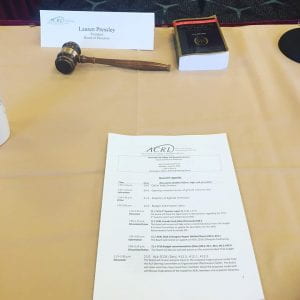
As many colleagues know, I had the honor and privilege of serving as the President of the Association of College and Research Libraries (ACRL) over the past academic year. ACRL represents more than 10,000 individuals and libraries and develops programs, products, and services to help those working in academic and research libraries learn, innovate, and lead within the academic community. ACRL was founded in 1940 and is committed to advancing learning and transforming scholarship. It is the largest division of the American Library Association (ALA) and accounts for nearly 20% of the total ALA membership.
As President, I had the opportunity to address a library issue of professional interest that may benefit the field. The program traditionally involves an event at the ALA Annual Conference. My President’s Program Committee helped expand this impact further, supplementing the annual event with an additional discussion forum at the ALA Midwinter Meeting and a series of blog posts to facilitate conversation throughout the year focusing on organizational change in support of Equity, Diversity, and Inclusion (EDI).
This theme is personally important to me, but is also a focus for ACRL. As the higher education association for librarians, ACRL is dedicated to creating diverse and inclusive communities in the association and in academic and research libraries. This Core Commitment permeates the work of the association, cutting across all ACRL sections, committees, interest and discussion groups, and communities of practice by acknowledging and addressing historical racial inequities; challenging oppressive systems within academic libraries; valuing different ways of knowing; and identifying and working to eliminate barriers to equitable services, spaces, resources, and scholarship.
The association lived this commitment in a number of ways during my term in office. The theme of the ACRL 2019 conference, “Recasting the Narrative,” directly supported our core commitment, offering featured programming throughout the conference on EDI issues. The conference included its first land acknowledgment and provided a variety of EDI resources on the conference website and onsite in Cleveland. We have also made changes to the ACRL committee appointment process to make it more transparent and inclusive. We are continually seeking ways to build a more equitable and inclusive association through providing training for association leaders, elevating diverse voices and perspectives, and revising systems and processes to be more equitable and inclusive.
The President’s Program Committee facilitated a powerful blog, which featured posts on topics such as engaging Historically Black Colleges and Universities (HBCUs), EDI in Library and Information Science (LIS) education, EDI in Community Colleges, and more. I am deeply appreciative for the featured authors who shared their expertise and knowledge in order to foster conversations to grow a more equitable and inclusive profession.
It has been a pleasure, and the honor of my career, to serve as ACRL President. The association, though its members, is doing significant and meaningful work in support of student learning, faculty research, evolving as a profession, and becoming more equitable and inclusive. If you are interested in learning more about our work over the past year, you can read about it in my Report to ALA Council.
As my year of intense service draws to a close (and I move into a final year of service as Past President), I want to thank my UW Tacoma Library colleagues for their support for this work. In particular I want to thank Justin Wadland for serving as Associate Director, and ensuring that the Library continued moving forward smoothly when I was away or busy with ACRL tasks. I am also grateful for Jill Purdy’s support of this work and my countless supportive colleagues across campus. This community enabled me to serve and lead ACRL in this capacity. I hope that as a result academic libraries are even better positioned to demonstrate value, facilitate student learning, enhance research and the scholarly environments, adapt to new roles and changing landscapes, and become more equitable and inclusive for their communities.